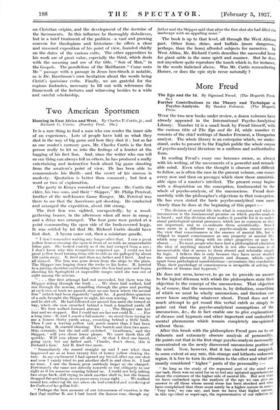Two American Sportsmen
Hunting in East Africa and West. By Charles P. Curtis, jr., and Richard G. Curtis. (Stanley Paul. Ilis.) • IT is a rare thing to find a man who can render the inner side of an experience. Lots of people have told us what they shot in the way of big game and how they shot it ; but so far as one reader's memory goes, Mr. Charles Curtis is the first person really to let us into the feelings of a hunter at the bagging of his first lion. And, since the writer who can tell us one thing can always tell us others, he has Produced a really entertaining and instructive book about big game shooting from the amateur's point of view. He has been able to communicate his thrills—and the secret of his success is modesty. Quotation is better than comment ; but first a word or two of explanation.
The party in Kenya consisted of four guns—Mr. Curtis the elder, his two sons, and their " Skipper," Mr. Philip Percival, brother of the well-known Game Ranger. Mr. Percival was there to see that the Americans got shooting. He conducted and arranged the expedition, about 100 strong.
The first lion was sighted, unexpectedly, by a wood- gathering bearer, in the afternoon when all were in camp ; and a drive, was arranged. The four guns were posted at a point commanding the open side of the bush-covered kopje. It was settled by lot that Mr. Richard Curtis should have first shot. A hyena came out, then a miniature gazelle.
" I don't remember waiting any longer after that. I saw a great yellow lioness crossing the open in front of us with an unmistakable feline gait. She looked exactly as if she had escaped from a zoo ; I don't know why this recognition surprised me. I could see her great yellow head turning from side to side as she galloped by about 150 yards away. R. fired and then my father and I fired. And we all missed. The lion was gone down from the slope to the plain. The Skipper ran leaping down the rocks to his home. R. hurried to a jutting shoulder overlooking where the lion had gone and began shooting his Springfield at impossible ranges until she was out of sight among the acacias.
" . . . Our first attempt had not succeeded, but there was the Skipper riding through the bush . . . Wo three half walked, half
ran through the acacias, stumbling through the grass and peering at each tree or bush we passed, since no one knew where the second lion" (which had been reported) "might be. A good three-quarters of a mile brought the Skipper in sight, his arm waving. We ran up and he slid off. He had followed our missed lion until she turned at bay, where she now crouched behind a bush a hundred yards off . . We four walked forward abreast . . . The Skipper saw her first and we stopped. But I could not see her nor could R. . . . For a long time—R. and I assert a full minute—me stood there trying to see a lioness thirty yards 'away, crouching behind a little bush. Then I saw a waxing yellow tail, much nearer than I had been looking for. R. started shooting. Two barrels and then two more. Hits certainly, but the tail still switched. ' Gentlemen,' said the Skipper, ' will you shoot lower please. We must •finish this off quickly. Will you please all shoot.' At that I fired one barrel, going over, but my father said, Charlie, don't shoot, this is Richard's lion.' And R. fired two more.
" Immediately she reared straight up and I saw what then impressed me as at least twenty feet of tawny yellow clawing the tree. In my excitement I had opened my breach after my one shot and now 1 vainly tried to put another shell in and close it. I had no time. I saw the lioness grow suddenly larger as she charged. Fortunately she came not directly towards us but obliquely to our right as if for someone running behind us. I could not help taking two steps back, still trying to stick another shell in, but the lioness dropped flat and limp, seven paces away to my right . . . We walked round her, admiring the tree where she had crouched and wondering at her limbs and her yellow hide.
" Perhaps the best measure of our intenseness of emotion is the fact that neither R. nor I had heard the lioness rear, -though my
father and the Skippersaid that after the first shot she had filled the landscape with an appalling noise." '
The book is up to that level, all through the West African part. Other lions, rhino, and buffalo (more dangerous, perhaps, than the lions) afforded subjects for narrative. In West Africa, Mr. Richard Curtis describes the successful hunt for giant sable in the same spirit and manner. But he does not anywhere quite reproduce the touch which is, for instance, in the words italicized above. Was Mr. Curtis remembering Homer, or does the epic style recur naturally ?


























































 Previous page
Previous page